AWM41 977 - [Nurses Narratives] Staff Nurse F G Gregson - Part 2
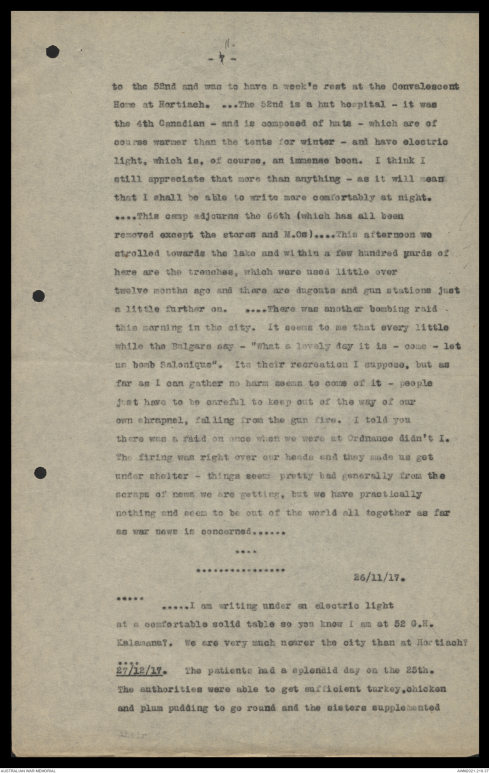
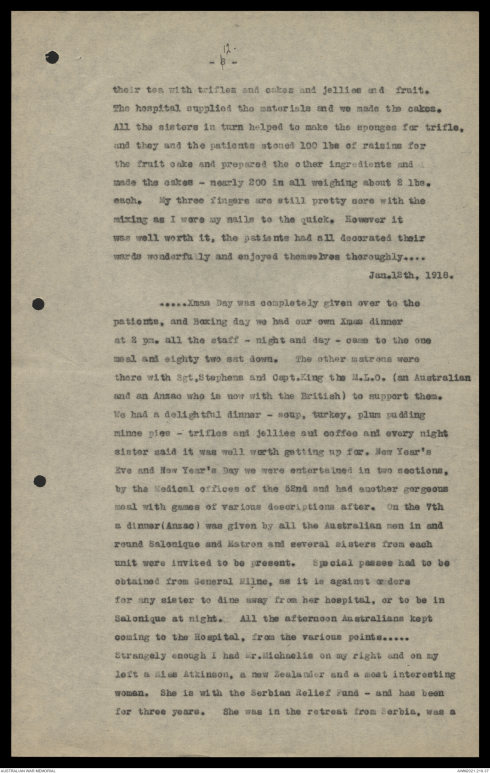
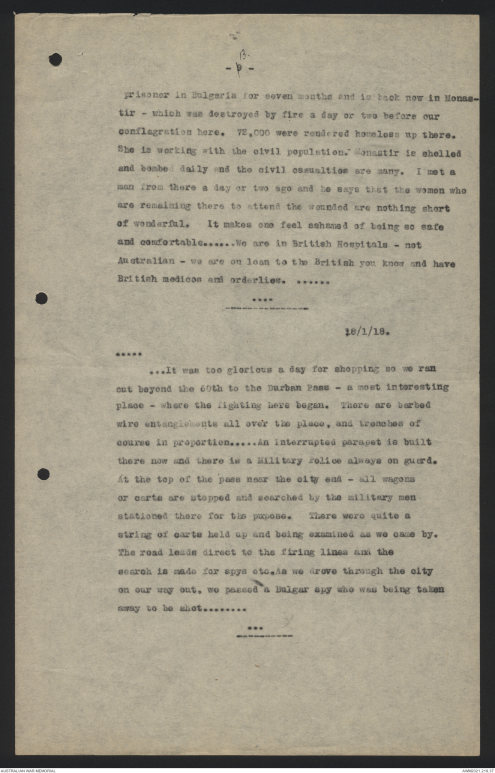
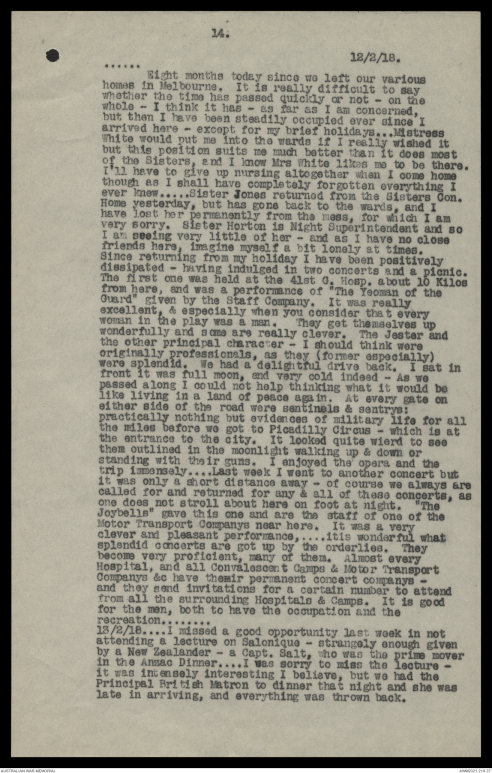
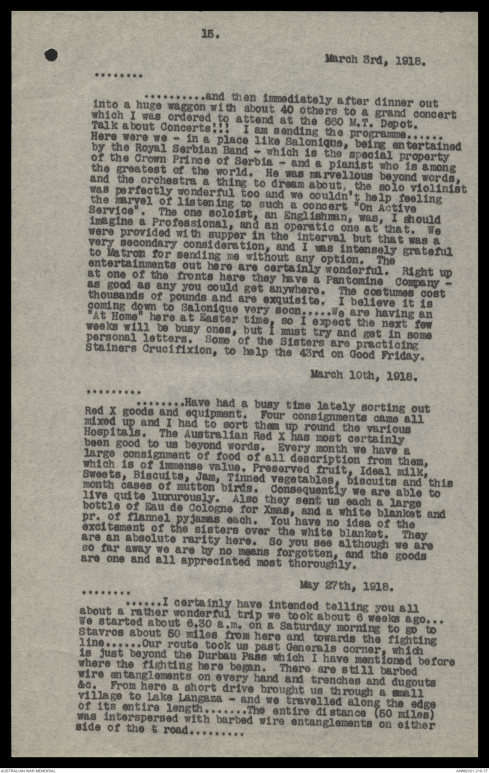
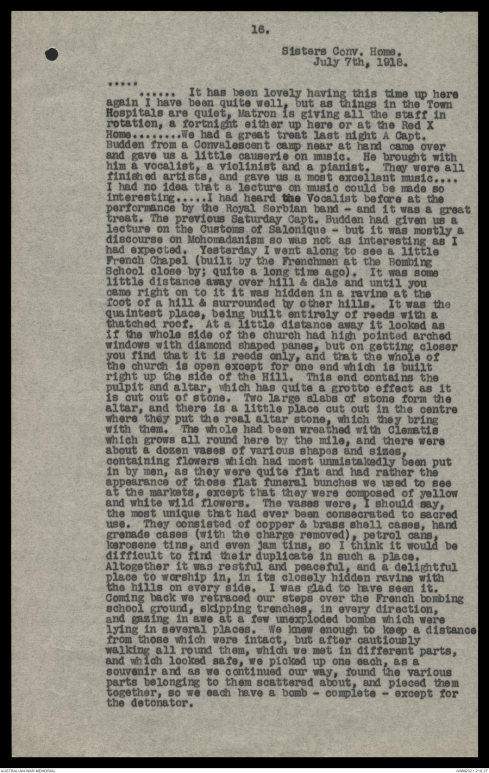
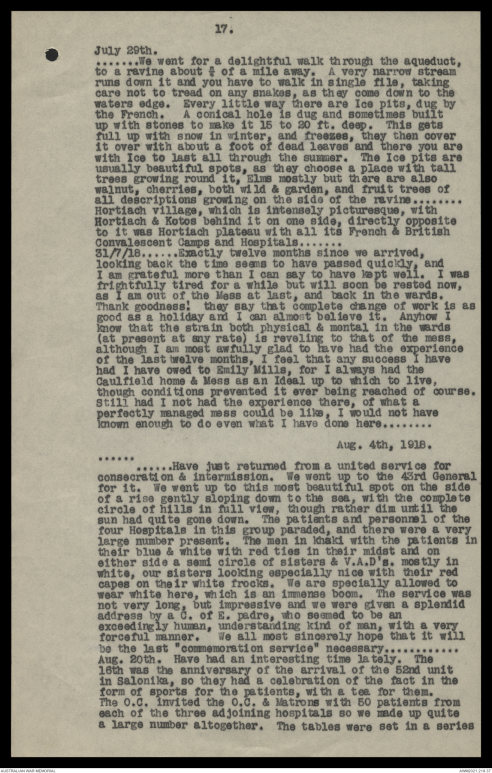
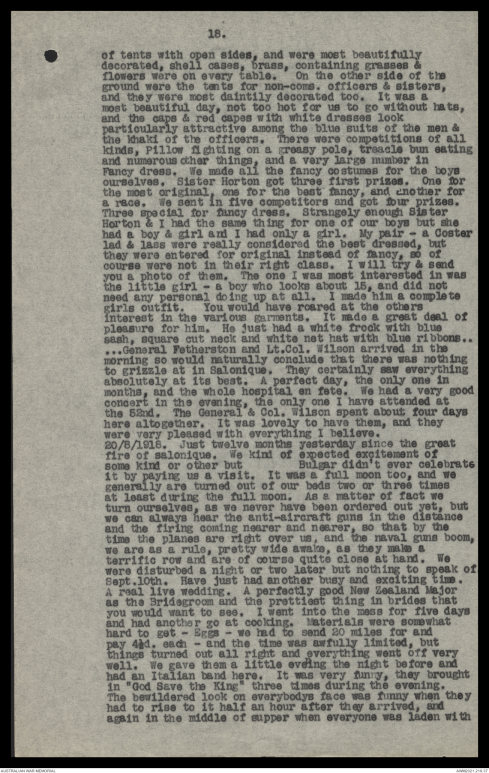
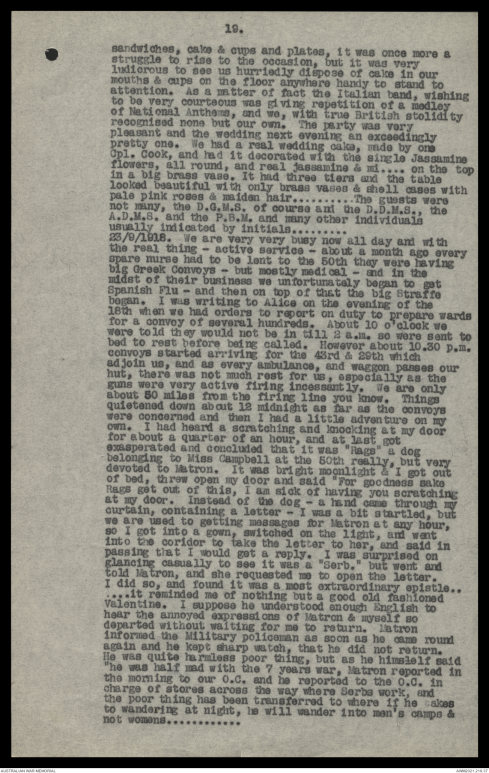
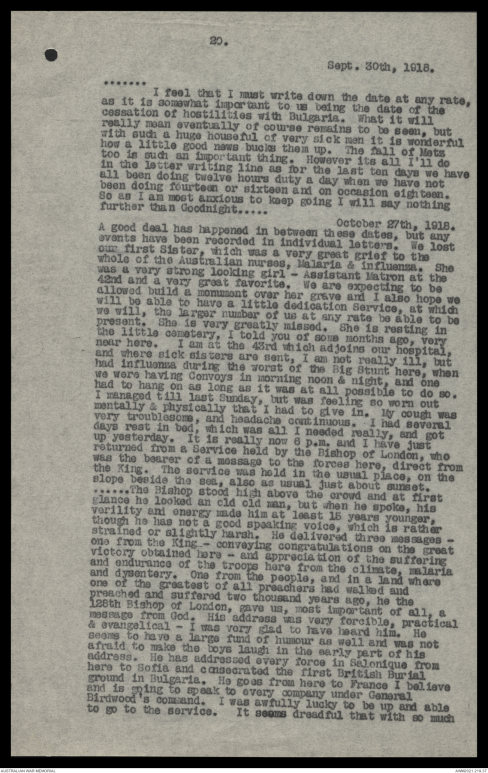
11.
- 7 -
to the 52nd and was to have a week's rest at the Convalescent
Home at Hortiach. ... The 52nd is a hut hospital - it was
the 4th Canadian - and is composed of huts - which are of
course warmer than the tents for winter - and have electric
light, which is, of course, an immense boon. I think I
still appreciate that more than anything - as it will mean
that I shall be able to write more comfortably at night.
.... This camp adjourns the 66th (which has all been
removed except the stores and M.Os).... This afternoon we
strolled towards the lake and within a few hundred yards of
here are the trenches, which were used little over
twelve months ago and there are dugouts and gun stations just
a little further on. .... There was another bombing raid
this morning in the city. It seems to me that every little
while the Bulgars say - "What a lovely day it is - come - let
us bomb Salonique". Its their recreation I suppose, but as
far as I can gather no harm seems to come of it - people
just have to be careful to keep out of the way of our
own shrapnel, falling from the gun fire. I told you
there was a raid on once when we were at Ordnance didn't I.
The firing was right over our heads and they made us get
under shelter - things seem pretty bad generally from the
scraps of news we are getting, but we have practically
nothing and seem to be out of the world all together as far
as war news is concerned......
26/11/17.
..... I am writing under an electric light
at a comfortable solid table so you know I am at 52 G.H.
Kalamanat. We are very much nearer the city than at Hortiach?
27/12/17. The patients had a splendid day on the 25th.
The authorities were able to get sufficient turkey, chicken
and plum pudding to go round and the sisters supplemented
12
- 8 -
their tea with trifles and cakes and jellies and fruit.
The hospital supplied the materials and we made the cakes.
All the sisters in turn helped to make the sponges for trifle,
and they and the patients stoned 100 lbs of raisins for
the fruit cake and prepared the other ingredients and
made the cakes - nearly 200 in all weighing about 2 lbs.
each. My three fingers are still pretty sore with the
mixing as I wore my nails to the quick. However it
was well worth it, the patients had all decorated their
wards wonderfully and enjoyed themselves thoroughly....
Jan.12th, 1918.
..... Xmas Day was completely given over to the
patients, and Boxing day we had our own Xmas dinner
at 2 pm. all the staff - night and day - came to the one
meal and eighty two sat down. The other matrons were
there with Sgt. Stephens and Capt. King the M.L.O. (an Australian
and an Anzac who is now with the British) to support them.
We had a delightful dinner - soup, turkey, plum pudding
mince pies - trifles and jellies and coffee and every night
sister said it was well worth getting up for. New Year's
Eve and New Year's Day we were entertained in two sections,
by the Medical offices of the 52nd and had another gorgeous
meal with games of various descriptions after. On the 7th
a dinner (Anzac) was given by all the Australian men in and
round Salonique and Matron and several sisters from each
unit were invited to be present. Special passes had to be
obtained from General Milne, as it is against orders
for any sister to dine away from her hospital, or to be in
Salonique at night. All the afternoon Australians kept
coming to the Hospital, from the various points.....
Strangely enough I had Mr. Michaelis on my right and on my
left a Miss Atkinson, a new Zealander and a most interesting
woman. She is with the Serbian Relief Fund - and has been
for three years. She was in the retreat from Serbia, was a
13
- 9 -
prisoner in Bulgaria for seven months and is back now in Monastir
- which was destroyed by fire a day or two before our
conflagration here. 72,000 were rendered homeless up there.
She is working with the civil population. Monastir is shelled
and bombed daily and the civil casualties are many. I met a
man from there a day or two ago and he says that the women who
are remaining there to attend the wounded are nothing short
of wonderful. It makes one feel ashamed of being so safe
and comfortable...... We are in British Hospitals - not
Australian - we are on loan to the British you know and have
British medicos and orderlies. .....
18/1/18.
... It was too glorious a day for shopping so we ran
out beyond the 60th to the Durban Pass - a most interesting
place - where the fighting here began. There are barbed
wire entanglements all over the places, and trenches of
course in proportion. An interrupted parapet is built
there now and there is a Military Police always on guard.
At the top of the pass near the city end - all wagons
or carts are stopped and searched by the military men
stationed there for the purpose. There were quite a
string of carts held up and being examined as we came by.
The road leads direct to the firing lines and the
search is made for spys etc. As we drove through the city
on our way out, we passed a Bulgar spy who was being taken
away to be shot. .......
14.
12/2/18.
..... Eight months today since we left our various
homes in Melbourne. It is really difficult to say
whether the time has passed quickly or not - on the
whole - I think it has - as far as I am concerned,
but then I have been steadily occupied ever since I
arrived here - except for my brief holidays ... Mistress
White would put me into the wards if I really wished it
but this position suits me much better than it does most
of the Sisters, and I know Mrs White likes me to be there.
I'll have to give up nursing altogether when I come home
though as I shall have completely forgotten everything I
ever knew. Sister Jones returned from the Sisters Con.
Home yesterday, but has gone back to the wards, and I
have lost her permanently from the mess, for which I am
very sorry. Sister Horton is Night Superintendent and so
I am seeing very little of her - and as I have no close
friends here, imagine myself a bit lonely at times.
Since returning from my holiday I have been positively
dissipated - having indulged in two concerts and a picnic.
The first one was held at the 41st G. Hosp, about 10 Kilos
from here, and was a performance of "The Yeoman of the
Guard" given by the Staff Company. It was really
excellent, & especially when you consider that every
woman in the play was a man. They get themselves up
wonderfully and some are really clever. The Jester and
the other principal character - I should think were
originally professionals, as they (former especially)
were splendid. We had a delightful drive back. I sat in
front it was full moon, and very cold indeed - As we
passed along I could not help thinking what it would be
like living in a land of peace again. At every gate on
either side of the road were sentinels & sentrys:
practically nothing but evidences of military life for all
the miles before we got to Picadilly Circus - which is at
the entrance to the city. It looked quite wierd to see
them outlined in the moonlight walking up & down or
standing with their guns. I enjoyed the opera and the
trip immensely. Last week I went to another concert but
it was only a short distance away - of course we always are
called for and returned for any & all of these concerts, as
one does not stroll about here on foot at night. "The
Joybells" gave this one and are the staff of one of the
Motor Transport Companys near here. It was a very
clever and pleasant performance, it is wonderful what
splendid concerts are got up by the orderlies. They
become very proficient, many of them. Almost every
Hospital, and all Convalescent Camps & Motor Transport
Companys &c have themir permanent concert companys -
and they send invitations for a certain number to attend
from all the surrounding Hospitals & Camps. It is good
for the men, both to have the occupation and the
recreation.......
13/2/18..... I missed a good opportunity last week in not
attending a lecture on Salonique - strangely enough given
by a New Zealander - a Capt. Salt, who was the prime mover
in the Anzac Dinner..... I was sorry to miss the lecture -
it was immensely interesting I believe, but we had the
Principal British Matron to dinner that night and she was
late in arriving, and everything was thrown back.
15.
March 3rd, 1918.
......... and then immediately after dinner out
into a huge waggon with about 40 others to a grand concert
which I was ordered to attend at the 660 M.T. Depot.
Talk about Concerts!!! I am sending the programme......
Here were we - in a place like Salonique, being entertained
by the Royal Serbian Band - which is the special property
of the Crown Prince of Serbia - and a pianist who is among
the greatest of the world. He was marvellous beyond words,
and the orchestra a thing to dream about, the solo violinist
was perfectly wonderful too and we couldn't help feeling
the marvel of listening to such a concert "On Active
Service". The one soloist, an Englishman, was, I should
imagine a Professional, and an operatic one at that. We
were provided with supper in the interval but that was a
very secondary consideration, and I was intensely grateful
to Matron for sending me without any option. The
entertainments out here are certainly wonderful. Right up
at one of the fronts here they have a Pantomine Company -
as good as any you could get anywhere. The costumes cost
thousands of pounds and are exquisite. I believe it is
coming down to Salonique very soon..... We are having an
"At Home" here at Easter time, so I expect the next few
weeks will be busy ones, but I must try and get in some
personal letters. Some of the Sisters are practicing
Stainers Crucifixion, to help the 43rd on Good Friday.
March 10th, 1918.
........ Have had a busy time lately sorting out
Red X goods and equipment. Four consignments came all
mixed up and I had to sort them up round the various
Hospitals. The Australian Red X has most certainly
been good to us beyond words. Every month we have a
large consignment of food of all description from them,
which is of immense value. Preserved fruit, Ideal milk,
Sweets, Biscuits, Jam, Tinned vegetables, biscuits and this
month cases of mutton birds. Consequently we are able to
live quite luxuriously. Also they sent us each a large
bottle of Eau de Cologne for Xmas, and a white blanket and
pr. of flannel pyjamas each. You have no idea of the
excitement of the sisters over the white blanket. They
are an absolute rarity here. So you see although we are
so far away we are by no means forgotten, and the goods
are one and all appreciated most thoroughly.
May 27th, 1918.
...... I certainly have intended telling you all
about a rather wonderful trip we took about 6 weeks ago.
We started about 6.30 a.m. on a Saturday morning to go to
Stavros about 50 miles from here and towards the fighting
line. Our route took us past Generals corner, which
is just beyond the Durbau Pass which I have mentioned before
where the fighting here began. There are still barbed
wire entanglements on every hand and trenches and dugouts
&c. From here a short drive brought us through a small
village to Lake Langaza - and we travelled along the edge
of its entire length........ The entire distance (50 miles)
was interspersed with barbed wire entanglements on either
side of the t road..........
16
Sisters Conv. Home.
July 7th, 1918.
...... It has been lovely having this time up here
again I have been quite well, but as things in the Town
Hospitals are quiet, Matron is giving all the staff in
rotation, a fortnight either up here or at the Red X
Home.......... We had a great treat last night A Capt.
Budden from a Convalescent camp near at hand came over
and gave us a little causerie on music. He brought with
him a vocalist, a violinist and a pianist. They were all
finished artists, and gave us a most excellent music....
I had no idea that a lecture on music could be made so
interesting..... I had heard the Vocalist before at the
performance by the Royal Serbian band - and it was a great
treat. The previous Saturday Capt. Budden had given us a
lecture on the Customs of Salonique - but it was mostly a
discourse on Mohomadanism so was not as interesting as I
had expected. Yesterday I went along to see a little
French Chapel (built by the Frenchmen at the Bombing
School close by; quite a long time ago). It was some
little distance away over hill & dale and until you
came right on to it it was hidden in a ravine at the
foot of a hill & surrounded by other hills. It was the
quaintest place, being built entirely of reeds with a
thatched roof. At a little distance away it looked as
if the whole side of the church had high pointed arched
windows with diamond shaped panes, but on getting closer
you find that it is reeds only, and that the whole of
the church is open except for one end which is built
right up the side of the Hill. This end contains the
pulpit and altar, which has quite a grotto effect as it
is cut out of stone. Two large slabs of stone form the
altar, and there is a little place cut out in the centre
where they put the real altar stone, which they bring
with them. The whole had been wreathed with Clematis
which grows all round here by the mile, and there were
about a dozen vases of various shapes and sizes,
containing flowers which had most unmistakedly been put
in by men, as they were quite flat and had rather the
appearance of those flat funeral bunches we used to see
at the markets, except that they were composed of yellow
and white wild flowers. The vases were, I should say,
the most unique that had ever been consecrated to sacred
use. They consisted of copper & brass shell cases, hand
grenade cases (with the charge removed), petrol cans,
kerosene tins, and even jam tins, so I think it would be
difficult to find their duplicate in such a place.
Altogether it was restful and peaceful, and a delightful
place to worship in, in its closely hidden ravine with
the hills on every side. I was glad to have seen it.
Coming back we retraced our steps over the French bombing
school ground, skipping trenches, in every direction,
and gazing in awe at a few unexploded bombs which were
lying in several places. We knew enough to keep a distance
from those which were intact, but after cautiously
walking all round them, which we met in different parts,
and which looked safe, we picked up one each, as a
souvenir and as we continued our way, found the various
parts belonging to them scattered about, and pieced them
together, so we each have a bomb - complete - except for
the detonator.
17.
July 29th.
........ We went for a delightful walk through the aqueduct,
to a ravine about ¾ of a mile away. A very narrow stream
runs down it and you have to walk in single file, taking
care not to tread on any snakes, as they come down to the
waters edge. Every little way there are Ice pits, dug by
the French. A conical hole is dug and sometimes built
up with stones to make it 15 to 20 ft. deep. This gets
full up with snow in winter, and freezes, they then cover
it over with about a foot of dead leaves and there you are
with Ice to last all through the summer. The Ice pits are
usually beautiful spots, as they choose a place with tall
trees growing round it, Elms mostly but there are also
walnut, cherries both wild & garden, and fruit trees of
all descriptions growing on the side of the ravine.......
Hortiach village, which is intensely picturesque, with
Hortiach & Kotos behind it on one side, directly opposite
to it was Hortiach plateau with all its French & British
Convalescent Camps and Hospitals.......
31/7/18...... Exactly twelve months since we arrived,
looking back the time seems to have passed quickly, and
I am grateful more than I can say to have kept well. I was
frightfully tired for a while but will soon be rested now,
as I am out of the Mess at last, and back in the wards.
Thank goodness! they say that complete change of work is as
good as a holiday and I can almost believe it. Anyhow I
know that the strain both physical & mental in the wards
(at present at any rate) is reveling to that of the mess,
although I am most awfully glad to have had the experience
of the last twelve months, I feel that any success I have
had I have owed to Emily Mills, for I always had the
Caulfield home & Mess as an Ideal up to which to live,
though conditions prevented it ever being reached of course.
Still had I not had the experience there, of what a
perfectly managed mess could be like, I would not have
known enough to do even what I have done here.
Aug. 4th, 1918.
...... Have just returned from a united service for
consecration & intermission. We went up to the 43rd General
for it. We went up to this most beautiful spot on the side
of a rise gently sloping down to the sea, with the complete
circle of hills in full view, though rather dim until the
sun had quite gone down. The patients and personnel of the
four Hospitals in the group paraded, and there were a very
large number present. The men in khaki with the patients in
their blue & white with red ties in their midst and on
either side a semi circle of sisters & V.A.D's, mostly in
white, our sisters looking especially nice with their red
capes on their white frocks. We are specially allowed to
wear white here, which is an immense boom. The service was
not very long, but impressive and we were given a splendid
address by a C. of E. padre, who seemed to be an
exceedingly human, understanding kind of man, with a very
forceful manner. We all most sincerely hope that it will
be the last "commemoration service" necessary...........
Aug. 20th. Have had an interesting time lately. The
16th was the anniversary of the arrival of the 52nd unit
in Salonika, so they had a celebration of the fact in the
form of sports for the patients, with a tea for them.
The O.C. invited the O.C. & Matrons with 50 patients from
each of the three adjoining hospitals so we made up quite
a large number altogether. The tables were set in a series
18.
of tents with open sides, and were most beautifully
decorated, shell cases, brass, containing grasses &
flowers were on every table. On the other side of the
ground were the tents for non-coms. officers & sisters,
and they were most daintily decorated too. It was a
most beautiful day, not too hot for us to go without hats,
and the caps & red capes with white dresses look
particularly attractive among the blue suits of the men &
the khaki of the officers. There were competitions of all
kinds, Pillow fighting on a greasy pole, treacle bun eating
and numerous other things, and a very large number in
Fancy dress. We made all the fancy costumes for the boys
ourselves. Sister Horton got three first prizes. One for
the most original, one for the best fancy, and another for
a race. We sent in five competitors and got four prizes.
Three special for fancy dress. Strangely enough Sister
Horton & I had the same thing for one of our boys but she
had a boy & girl and I had only a girl. My pair - a Coster
lad & lass were really considered the best dressed, but
they were entered for original instead of fancy, so of
course were not in their right class. I will try & send
you a photo of them. The one I was most interested in was
the little girl - a boy who looks about 15, and did not
need any personal doing up at all. I made him a complete
girls outfit. You would have roared at the others
interest in the various garments. It made a great deal of
pleasure for him. He just had a white frock with blue
sash, square cut neck and white net hat with blue ribbons.
General Fetherston and Lt.Col. Wilson arrived in the
morning so would naturally conclude that there was nothing
to grizzle at in Salonique. They certainly saw everything
absolutely at its best. A perfect day, the only one in
months, and the whole hospital en fete. We had a very good
concert in the evening, the only one I have attended at
the 52nd. The General & Col. Wilson spent about four days
here altogether. It was lovely to have them, and they
were very pleased with everything I believe.
20/8/1918. Just twelve months yesterday since the great
fire of salonique. We kind of expected excitement of
some kind or other but Bulgar didn't ever celebrate
it by paying us a visit. It was a full moon too, and we
generally are turned out of our beds two or three times
at least during the full moon. As a matter of fact we
turn ourselves, as we never have been ordered out yet, but
we can always hear the anti-aircraft guns in the distance
and the firing coming nearer and nearer, so that by the
time the planes are right over us, and the naval guns boom,
we are as a rule, pretty wide awake, as they make a
terrific row and are of course quite close at hand. We
were disturbed a night or two later but nothing to speak of
Sept.10th. Have just had another busy and exciting time.
A real live wedding. A perfectly good New Zealand Major
as the Bridegroom and the prettiest thing in brides that
you would want to see. I went into the mess for five days
and had another go at cooking. Materials were somewhat
hard to get - Eggs - we had to send 20 miles for and
pay 4½d. each - and the time was awfully limited, but
things turned out all right and everything went off very
well. We gave them a little evening the night before and
had an Italian band here. It was very funny, they brought
in "God Save The King" three times during the evening.
The bewildered look on everybodys face was funny when they
had to rise to it half an hour after they arrived, and
again in the middle of supper when everyone was laden with
19.
sandwiches, cake & cups and plates, it was once more a struggle to rise to the occasion, but it was very
ludicrous to see us hurriedly dispose of cake in our
mouths & cups on the floor anywhere handy to stand to
attention. As a matter of fact the Italian band, wishing
to be very courteous was giving repetition of a medley
of National Anthems, and we, with true British stolidity
recognised none but our own. The party was very
pleasant and the wedding next evening an exceedingly
pretty one. We had a real wedding cake, made by one
Cpl. Cook, and had it decorated with the single Jassamine
flowers, all round, and real jassamine & mi.... on the top
in a big brass vase. It had three tiers and the table
looked beautiful with only brass vases & shell cases with
pale pink roses & maiden hair......... The guests were
not many, the D.G.M.S. of course and the D.D.M.S., the
A.D.M.S. and the P.B.M and many other individuals
usually indicated by initials.......
23/9/1918. We are very very busy now all day and with
the real thing - active service - about a month ago every
spare nurse had to be lent to the 50th they were having
big Greek Convoys - but mostly medical - and in the
midst of their business we unfortunately began to get
Spanish Flu - and then on top of that the big Straffe
began. I was writing to Alice on the evening of the
18th when we had orders to report on duty to prepare wards
for a convoy of several hundreds. About 10 o'clock we
were told they would not be in till 2 a.m. so were sent to
bed to rest before being called. However about 10.30 p.m.
convoys started arriving for the 43rd & 29th which
adjoin us, and as every ambulance, and waggon passes our
hut, there was not much rest for us, especially as the
guns were very active firing incessantly. We are only
about 50 miles from the firing line you know. Things
quietened down about 12 midnight as far as the convoys
were concerned and then I had a little adventure on my
own. I had heard a scratching and knocking at my door
for about a quarter of an hour, and at last got
exasperated and concluded that it was "Rags" a dog
belonging to Miss Campbell at the 50th really, but very
devoted to Matron. It was bright moonlight & I got out
of bed, threw open my door and said "For goodness sake
Rags get out of this, I am sick of having you scratching
at my door. Instead of the dog - a hand came through my
curtain, containing a letter - I was a bit startled, but
we are used to getting messages for Matron at any hour,
so I got into a gown, switched on the light, and went
into the coridor to take the letter to her, and said in
passing that I would get a reply. I was surprised on
glancing casually to see it was a "Serb." but went and
told Matron, and she requested me to open the letter.
I did so, and found it was a most extraordinary epistle.
.... it reminded me of nothing but a good old fashioned
Valentine. I suppose he understood enough English to
hear the annoyed expressions of Matron & myself so
departed without waiting for me to return. Matron
informed the Military policeman as soon as he came round
again and he kept sharp watch, that he did not return.
He was quite harmless poor thing, but as he himself said
"he was half mad with the 7 years war, Matron reported in
the morning to our O.C. and he reported it to the O.C. in
charge of stores across the way where Serbs work, and
the poor thing has been transferred to where if he takes
to wandering at night, he will wander into men's camps &
not womens...........
20.
Sept. 30th, 1918.
..... I feel that I must write down the date at any rate,
as it is somewhat important to us being the date of the
cessation of hostilities with Bulgaria. What it will
really mean eventually of course remains to be seen, but
with such a huge houseful of very sick men it is wonderful
how a little good news bucks them up. The fall of Metz
too is such an important thing. However its all I'll do
in the letter writing line as for the last ten days we have
all been doing twelve hours duty a day when we have not
been doing fourteen or sixteen and on occasion eighteen.
So as I am most anxious to keep going I will say nothing
further than Goodnight......
October 27th, 1918.
A good deal has happened in between these dates, but any
events have been recorded in individual letters. We lost
our first Sister, which was a very great grief to the
whole of the Australian nurses, Malaria & influenza. She
was a very strong looking girl - Assistant Matron at the
42nd and a very great favourite. We are expecting to be
allowed build a monument over her grave and I also hope we
will be able to have a little dedication Service, at which
we will, the larger number of us at any rate be able to be
present. She is very greatly missed. She is resting in
the little cemetery, I told you of some months ago, very
near here. I am at the 43rd which adjoins our hospital,
and where sick sisters are sent, I am not really ill, but
had influenza during the worst of the Big Stunt here, when
we were having Convoys in morning noon & night, and one
had to hang on as long as it was possible to do so.
I managed till last Sunday, but was feeling so worn out
mentally & physically that I had to give in. My cough was
very troublesome, and headache continuous. I had several
days rest in bed, which was all I needed really, and got
up yesterday. It is really now 6 p.m. and I have just
returned from a Service held by the Bishop of London, who
was the bearer of a message to the forces here, direct from
the King. The service was held in the usual place, on the
slope beside the sea, also as usual just about sunset.
..... The Bishop stood high above the crowd and at first
glance he looked like an old old man, but when he spoke, his
verility and energy made him at least 15 years younger,
though he has not a good speaking voice, which is rather
strained or slightly harsh. He delivered three messages -
one from the King - conveying congratulations on the great
victory obtained here - and appreciation of the suffering
and endurance of the troops here from the climate, malaria
and dysentery. One from the people, and in a land where
one of the greatest of all preachers had walked and
preached and suffered two thousand years ago, he the
128th Bishop of London, gave us, most important of all, a
message from God. His address was very forcible, practical
& evangelical - I was very glad to have heard him. He
seems to have a large fund of humour as well and was not
afraid to make the boys laugh in the early part of his
address. He has addressed every force in Salonique from
here to Sofia and consecrated the first British Burial
ground in Bulgaria. He goes from here to France I believe
and is going to speak to every company under General
Birdwood's command. I was awfully lucky to be up and able
to go to the service. It seems dreadful that with so much
 Sam scott
Sam scottThis transcription item is now locked to you for editing. To release the lock either Save your changes or Cancel.
This lock will be automatically released after 60 minutes of inactivity.